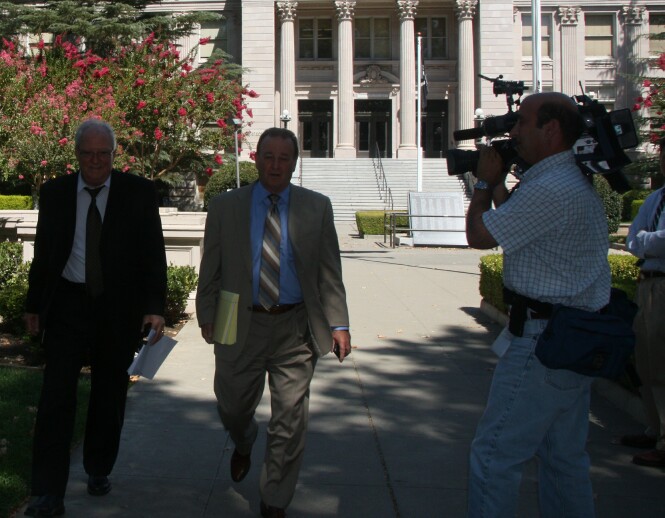 As the Vanguard reported on Wednesday, there are now questions as to whether Juror No.11 was properly dismissed on November 14 by Judge Paul Richardson from the penalty phase of Marco Topete’s trial for the murder of Sheriff’s Deputy Tony Diaz. This occured after a brief inquiry, in which he determined the request for dismissal was based on a language barrie
As the Vanguard reported on Wednesday, there are now questions as to whether Juror No.11 was properly dismissed on November 14 by Judge Paul Richardson from the penalty phase of Marco Topete’s trial for the murder of Sheriff’s Deputy Tony Diaz. This occured after a brief inquiry, in which he determined the request for dismissal was based on a language barrie
Juror No.11 sent the Court a hand-written note asking to be excused from further deliberation and replaced with an alternate juror. Following the brief inquiry, Judge Richardson made the decision to replace Juror No.11.
A little more than a week later, Juror No.6 told the Davis Enterprise that the juror had been opposed to the death penalty in this case.
“She said under no circumstances will she go for the death penalty,” the juror, who is apparently a Davis resident but is withholding his name, told the Enterprise four days after the jury came back with a death sentence recommendation.
The Vanguard has discovered a California Supreme Court ruling from December 12 that overturned the conviction of two men who have been sitting on death row for nearly 14 years, on grounds that the trial court denied them their right to a fair trial by improperly dismissing a juror.
According to the ruling by the California Supreme Court, “During guilt phase deliberations, two jurors reported their concern that another juror had made up his mind before the case was submitted to the jury.”
The court added, “After speaking with all panel members, the court discharged that juror for having prejudged the case, and for having relied on evidence not presented at trial. Based on this record, the court erred.”
The facts of the case were that both defendants were members of a Los Angeles criminal street gang. The court writes, “On August 5, 1991, Johnson told Allen to shoot rival gang member Beroit. Witnesses testified Allen shot both Beroit and Loggins as they sat in a parked car.”
The court continued: “One witness of note was Carl Connor. He claimed to have been near the scene at the time of the shootings and identified Allen as the shooter. Defendants impeached Connor’s testimony by introducing evidence of his employment timecard that showed he was at work on the day of the crime. Connor explained that he and a coworker, ‘Jose,’ often clocked in for each other, so the records would indicate they were at work when in fact they were not.”
The court would discharge the Juror No.11 in this matter for “asserted misconduct during the guilt phase.”
Juror No.5, who was the foreperson, and Juror No.4 reported to the court their belief that Juror No.11 “had prejudged the case while evidence was still being presented.”
The court then conducted a lengthy investigation and interviewed all 12 jurors – something that never occurred during the Topete trial.
The judge then concluded that Juror No.11 “prejudged the case and was relying on evidence not presented at the trial, the court discharged him and seated an alternate juror. The reconstituted jury found defendants guilty and later returned death verdicts.”
The court finds that the court “exceeded its discretion under [Penal Code] section 1089[3sic] when it removed him and seated an alternate. Because the record does not show to a demonstrable reality that Juror No. 11 was unable to discharge his duty, the court abused its discretion by removing him.”
While it is clear that the circumstances of these two cases do not entirely match, a few points need to be noted here.
First, Judge Richardson, unlike the Judge in this case, never interviewed other jurors. That might prove critical. As we know from what Juror No.6 has said, reasons other than the language barrier would have arisen. Had Judge Richardson spoken to the panel, he might have had a better sense of this to begin with and also a better sense as to whether Juror No.11 in the Topete case could have carried out of her duties.
Would an appellate court, particularly knowing what we now know, have concluded that Judge Richardson exceeded his discretion by removing the juror? It seems very possible.
The Vanguard spoke with Elisabeth Semel, a Clinical Professor of Law and the Director of the Death Penalty Clinic at UC Berkeley’s School of Law.
While Professor Semel was not familiar enough with the Topete case to comment, in speaking in general terms she noted, “Most of trial lawyers have been involved in at least one case in which a question arose about whether the majority was pressuring the minority (in terms of numbers) to go along.”
“So while this is not the norm, situations like this — assuming that is what occurred — are not uncommon. The pressure to reach a verdict — especially in a capital case where emotions often run very high — can be enormous,” she added.
“Judges need to be vigilant to ensure that jurors understand and adhere to all the instructions, including instructions intended to protect a juror’s right to reach and adhere to his or her individual verdict,” Professor Semel told the Vanguard.
The problem, as we noted from the start, was that if the juror really lacked command of the English language to have performed her duties in the penalty phase, how could she understand enough English to render a guilty verdict, but not enough to participate in the deliberation on the penalty phase?
Juror No.11 sent the Court a hand-written note asking to be excused from further deliberation and replaced with an alternate juror.
Juror 11 wrote, “Your Honor: I was raised in foreign country and it is very difficult for me to make a dessision from point of view of this country. I tried my best, but now I see that I am dragging other juries down. I am asking you to replace me by alternative juror, please.”
Moreover, as we previously argued, it almost seemed like she was offered a way out by the Judge focusing on the language issue, and she took it.
Judge Richardson asked her if there were a language barrier and if she had been having trouble understanding the nuances of the language. She said that she might be having trouble with the nuances, but that is not the principle issue.
She then said that the language barrier was “partially” the issue and that sometimes she cannot understand the words because she said some words you cannot translate.
She said she had felt inhibited in the deliberation process, she said that she had not participated freely and there was a limitation in her language skills.
Judge Richardson really did not probe her sufficiently on whether there were ideological issues that were causing the problems with her colleagues. He tried to avoid substantive issues, but still needed to determine whether language was really the root cause or whether it was something else.
The Supreme Court case suggests the possibility that Judge Richardson erred here.
The Supreme Court writes, “Because of the importance of juror independence, review of the decision to discharge a juror involves ‘a somewhat stronger showing’ than is typical for abuse of discretion review . . . .”
They continue: “The basis for a juror’s discharge must appear on the record as a ‘demonstrable reality’ ” and “involves ‘a more comprehensive and less deferential review’ than simply determining whether any substantial evidence” supports the court’s decision.”
Critically, the court must determine whether the court’s “conclusion is manifestly supported by evidence on which the court actually relied.” In this case, it appears that the court erred by not probing deeply enough into Juror No.11’s issues and not doing a more general inquiry that would have revealed reasons other than language as a basis for the request for dismissal.
—David M. Greenwald reporting





[quote]While it is clear that the circumstances of these two cases do not entirely match…[/quote]
Precisely…
[quote]While it is clear that the circumstances of these two cases do not entirely match…[/quote]
Precisely…
[quote]While it is clear that the circumstances of these two cases do not entirely match…[/quote]
Precisely…
[quote]While it is clear that the circumstances of these two cases do not entirely match…[/quote]
Precisely…
[quote]While it is clear that the circumstances of these two cases do not entirely match…[/quote]
Precisely…
[quote]While it is clear that the circumstances of these two cases do not entirely match…[/quote]
Precisely…
I don’t know what happened, but sorry about the repeats!
Grasping at straws again I see…
So what?
Topete can fight the needle until he dies from old age. One way or another he isn’t getting out standing up. The only issue here is how much money the state will spend defending his sentence as if it was going to be implemented someday. Now that is a huge waste of money. The cheapest solution would be for the Appeals court to reduce his sentence to life without parole as that will be the final outcome anyway.
Mr. Toad: I agree with most of what you are saying – it’s the point I have been making for a long time, but the appeals court isn’t going to commute the sentence, they will order a new trial if Judge Richardson keeps the case as is. The cheapest thing to do would be for Judge Richardson to reduce it to LWOP, that eliminates the problems at the penalty phase and gives him the result that as you point out, will occur anyway (saving the state a lot of money in the process).
[quote]The cheapest thing to do would be for Judge Richardson to reduce it to LWOP, that eliminates the problems at the penalty phase and gives him the result that as you point out, will occur anyway (saving the state a lot of money in the process).[/quote]
Does Judge Richardson have the authority to change the sentence to LWOP now? Judge Richardson has already removed Juror #11, the death sentence was imposed. It is now in the hands of the appellate courts, no? Or did I miss something…
If you read the previous article you would see that in death penalty cases the jury recommends the sentence, but the judge has ultimate authority to hand down the sentence.
[quote]If you read the previous article you would see that in death penalty cases the jury recommends the sentence, but the judge has ultimate authority to hand down the sentence.[/quote]
But Judge Richardson has already handed down his sentence, and it is now in the hands of the appellate courts, no?
“But Judge Richardson has already handed down his sentence”
No he has not. The sentencing is scheduled for January 12. Please get your facts right here.
DMG,
I was a little disappointed that, with your coverage of the Topete trial, you did not cover the DA’s response on Thursday. Garrett Hamilton’s response are along the lines of what I have been saying all along. Namely, juror #6’s responses are inadmissible hearsay, and just because she was having trouble with the legal documents in the penalty phase does not mean that she was having trouble with anything in the guilt phase.
-David Grundler
BTW, I was having all kinds of problems from the beginning with my account “dgrundler.” More often than not, the system would not let me post comments. I created this new account, which has been trouble free. Just an FYI.